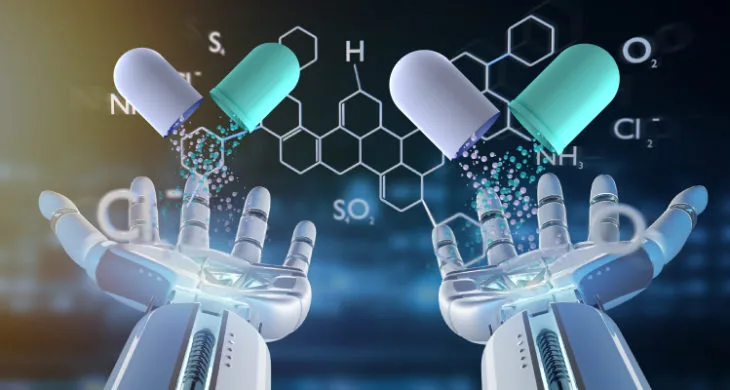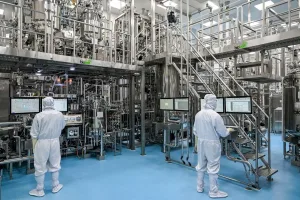A groundbreaking development in artificial intelligence (AI) is poised to revolutionize the way new drugs are discovered and developed. With AI algorithms now capable of predicting molecular behavior and accelerating the screening of potential drug candidates, the pharmaceutical industry could see faster, more cost-effective pathways to create life-saving medications.
What is AI-Powered Drug Discovery?
AI-powered drug discovery involves using machine learning and other artificial intelligence techniques to identify potential drug candidates more efficiently than traditional methods. By analyzing vast datasets, AI can predict how different molecules will interact with biological targets, allowing researchers to identify promising compounds with greater speed and accuracy.
Traditionally, drug discovery has been a lengthy and expensive process, often taking years to identify and bring a new drug to market. With AI’s ability to process and analyze large volumes of data, the timeline for discovering effective treatments could be dramatically reduced, cutting down on costs and improving the overall success rate of new drugs.
The Breakthrough: Faster and More Accurate Drug Discovery
The latest breakthrough in AI-powered drug discovery comes from a new AI model that has shown remarkable success in predicting how small molecules will bind to disease-related proteins. This ability to predict molecular behavior and interactions with high precision means that researchers can focus on the most promising drug candidates earlier in the process, eliminating less effective compounds more efficiently.
AI models are also being trained to simulate human biology more accurately, meaning the drugs identified through these methods are more likely to be successful in clinical trials. This could significantly reduce the failure rate of new drugs, which currently costs the pharmaceutical industry billions each year.
How AI Could Speed Up the Development of Life-Saving Medications
AI’s ability to analyze biological data at scale and predict potential drug interactions opens up new possibilities for drug development. One of the key advantages is the speed with which new treatments can be developed. What once took years of manual research can now be accomplished in a fraction of the time, allowing scientists to accelerate the drug discovery process and bring much-needed treatments to market faster.
In addition to speed, AI-powered systems also enable a more targeted approach to drug development. By focusing on the most promising drug candidates early on, the research process becomes more streamlined, reducing wasted time and resources. This could ultimately lower the cost of drug development, making new medications more accessible to patients around the world.
The Implications for Healthcare and the Pharmaceutical Industry
The implications of this breakthrough for the pharmaceutical industry are profound. AI’s integration into drug discovery could reshape how pharmaceutical companies operate, making the entire drug development process more efficient and cost-effective. As a result, the development of medications for a wider range of diseases—especially rare and complex conditions—could be accelerated, leading to faster treatments and better outcomes for patients.
AI could also democratize access to cutting-edge treatments. By reducing the cost and time required to develop new drugs, this technology could make life-saving medications more affordable and accessible to underserved populations around the world.
Overcoming Challenges in AI Drug Discovery
Despite the tremendous potential, the use of AI in drug discovery still faces several challenges. One of the key hurdles is ensuring the accuracy and reliability of AI models. While AI algorithms can analyze large datasets, they still rely on high-quality input data, which can sometimes be incomplete or biased. Addressing these issues is crucial to ensuring that AI-driven drug discovery leads to safe and effective medications.
Additionally, the integration of AI into the pharmaceutical industry will require significant collaboration between data scientists, biologists, and healthcare professionals. Training AI models to accurately simulate complex biological processes and predict how drugs will behave in human bodies requires expertise from multiple fields, and successful collaboration will be essential for achieving meaningful breakthroughs.
The Future of AI in Healthcare
The success of AI in drug discovery is just the beginning. As AI technology continues to advance, it has the potential to transform other areas of healthcare as well, from personalized medicine to diagnostic tools and treatment planning. With AI’s ability to process vast amounts of medical data, we could see a future where treatments are tailored more precisely to individual patients, improving outcomes and reducing the risk of side effects.
In the coming years, we can expect to see even greater innovations in AI-driven healthcare solutions. By leveraging the power of machine learning and AI, researchers and healthcare professionals can unlock new pathways for treating diseases and improving the overall health and well-being of patients worldwide.
Conclusion: A New Era of Drug Development
AI-powered drug discovery represents a major breakthrough in the search for new, life-saving medications. By harnessing the power of artificial intelligence, researchers can accelerate drug development, reduce costs, and improve the overall success rate of new treatments. This innovation has the potential to transform the pharmaceutical industry, ultimately leading to more effective and accessible medications for patients around the world.
As AI continues to evolve, its impact on healthcare will only grow, offering new hope for tackling some of the most pressing medical challenges of our time.
AIDrugDiscovery #PharmaceuticalInnovation #AIinHealthcare #DrugDevelopment #MedTech #HealthTech #ArtificialIntelligence #FutureOfMedicine #PharmaResearch #MedicalBreakthrough




+ There are no comments
Add yours